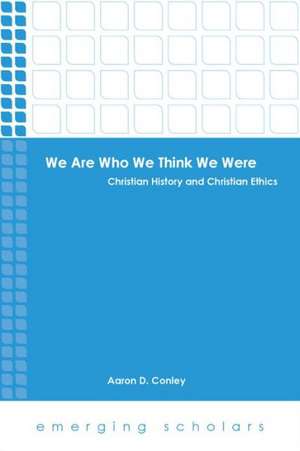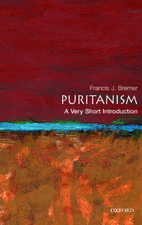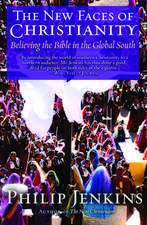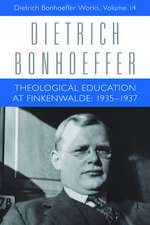We Are Who We Think We Were: Christian History and Christian Ethics: Emerging Scholars
Autor Aaron D. Conleyen Limba Engleză Paperback – 31 iul 2013
Din seria Emerging Scholars
-
 Preț: 342.54 lei
Preț: 342.54 lei - 19%
 Preț: 471.38 lei
Preț: 471.38 lei -
 Preț: 365.11 lei
Preț: 365.11 lei -
 Preț: 340.63 lei
Preț: 340.63 lei -
 Preț: 360.28 lei
Preț: 360.28 lei -
 Preț: 433.26 lei
Preț: 433.26 lei - 19%
 Preț: 469.96 lei
Preț: 469.96 lei -
 Preț: 361.24 lei
Preț: 361.24 lei -
 Preț: 285.30 lei
Preț: 285.30 lei -
 Preț: 508.75 lei
Preț: 508.75 lei -
 Preț: 508.95 lei
Preț: 508.95 lei -
 Preț: 284.92 lei
Preț: 284.92 lei -
 Preț: 514.89 lei
Preț: 514.89 lei -
 Preț: 338.72 lei
Preț: 338.72 lei -
 Preț: 359.12 lei
Preț: 359.12 lei - 19%
 Preț: 479.92 lei
Preț: 479.92 lei -
 Preț: 366.05 lei
Preț: 366.05 lei -
 Preț: 375.88 lei
Preț: 375.88 lei -
 Preț: 435.21 lei
Preț: 435.21 lei -
 Preț: 362.78 lei
Preț: 362.78 lei -
 Preț: 384.13 lei
Preț: 384.13 lei -
 Preț: 436.36 lei
Preț: 436.36 lei -
 Preț: 437.30 lei
Preț: 437.30 lei -
 Preț: 436.15 lei
Preț: 436.15 lei -
 Preț: 435.21 lei
Preț: 435.21 lei -
 Preț: 394.73 lei
Preț: 394.73 lei -
 Preț: 362.39 lei
Preț: 362.39 lei -
 Preț: 362.23 lei
Preț: 362.23 lei -
 Preț: 364.69 lei
Preț: 364.69 lei -
 Preț: 433.64 lei
Preț: 433.64 lei -
 Preț: 330.06 lei
Preț: 330.06 lei -
 Preț: 362.23 lei
Preț: 362.23 lei -
 Preț: 325.22 lei
Preț: 325.22 lei -
 Preț: 509.12 lei
Preț: 509.12 lei -
 Preț: 332.93 lei
Preț: 332.93 lei -
 Preț: 428.46 lei
Preț: 428.46 lei - 19%
 Preț: 469.96 lei
Preț: 469.96 lei -
 Preț: 429.41 lei
Preț: 429.41 lei - 19%
 Preț: 469.96 lei
Preț: 469.96 lei -
 Preț: 364.30 lei
Preț: 364.30 lei -
 Preț: 370.88 lei
Preț: 370.88 lei -
 Preț: 432.50 lei
Preț: 432.50 lei -
 Preț: 455.41 lei
Preț: 455.41 lei -
 Preț: 362.61 lei
Preț: 362.61 lei -
 Preț: 432.11 lei
Preț: 432.11 lei -
 Preț: 428.46 lei
Preț: 428.46 lei -
 Preț: 360.28 lei
Preț: 360.28 lei -
 Preț: 435.39 lei
Preț: 435.39 lei -
 Preț: 365.49 lei
Preț: 365.49 lei
Preț: 430.37 lei
Nou
Puncte Express: 646
Preț estimativ în valută:
82.35€ • 86.20$ • 68.54£
82.35€ • 86.20$ • 68.54£
Carte tipărită la comandă
Livrare economică 31 martie-14 aprilie
Preluare comenzi: 021 569.72.76
Specificații
ISBN-13: 9781451469318
ISBN-10: 1451469314
Pagini: 185
Dimensiuni: 150 x 226 x 13 mm
Greutate: 0.27 kg
Ediția:New.
Editura: Fortress Press
Seria Emerging Scholars
ISBN-10: 1451469314
Pagini: 185
Dimensiuni: 150 x 226 x 13 mm
Greutate: 0.27 kg
Ediția:New.
Editura: Fortress Press
Seria Emerging Scholars
Notă biografică
Recenzii
"A masterful, energetic exploration of the interface between our construction of historical storylines and our ethics. This book is a welcome plea for locating dialogues across differences at the center of Christian beliefs and practices during the twenty-first century." Vernon K. Robbins Emory University "We Are Who We Think We Were is an ambitious yet carefully constructed critique of mainstream Christian ethicists' uses and abuses of history. Not only does Conley make a persuasive case for why and how historical method matters for Christian ethicists who take seriously the moral demands of justice, the critical self-reflective methodology he develops points to important constructive possibilities for telling our stories in other ways." Yvonne C. Zimmerman Methodist Theological School in Ohio "Conley advocates thoroughgoing deconstruction with self-critical awareness of the power-interests and subliminal loyalties driving the narrative-tradition that shapes our historical self-understanding. He provides improved articulateness for what I intend by a 'historical drama' approach, with continuous repentance in participative community, with realistic attention to self-correcting data from diverse others, and to the struggle for delivering justice. We all need to learn from Conley." Glen Stassen Fuller Theological Seminary















